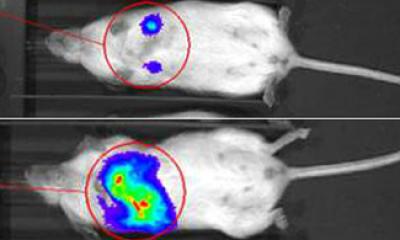Enzyme controlling metastasis of breast cancer identified

This image depicts a tumor with reduced levels of enzyme UBC13 (top) and a control tumor (bottom) that has spread to the lungs. Credit: UC San Diego School of Medicine
“The take-home message of the study is that we have found a way to target breast cancer metastasis through a pathway regulated by an enzyme,” said lead author Xuefeng Wu, PhD, a postdoctoral researcher at UC San Diego.
The enzyme, called UBC13, was found to be present in breast cancer cells at two to three times the levels of normal healthy cells. Although the enzyme's role in regulating normal cell growth and healthy immune system function is well-documented, the study is among the first to show a link to the spread of breast cancer.
Specifically, Wu and colleagues with the UC San Diego Moores Cancer Center found that the enzyme regulates cancer cells' ability to transmit signals that stimulate cell growth and survival by regulating the activity of a protein called p38 which when “knocked down” prevents metastasis. Of clinical note, the researchers said a compound that inhibits the activation of p38 is already being tested for treatment of rheumatoid arthritis.
In their experiments, scientists took human breast cancer cell lines and used a lentivirus to silence the expression of both the UBC13 and p38 proteins. These altered cancer cells were then injected into the mammary tissues of mice. Although the primary tumors grew in these mice, their cancers did not spread.
“Primary tumors are not normally lethal,” Wu said. “The real danger is cancer cells that have successfully left the primary site, escaped through the blood vessels and invaded new organs. It may be only a few cells that escape, but they are aggressive. Our study shows we may be able to block these cells and save lives.”
Researchers have also defined a metastasis gene signature that can be used to evaluate clinical responses to cancer therapies that target the metastasis pathway.
Co-authors include: Weizhou Zhang, UC San Diego and University of Iowa; Joan Font-Burgada,Trenis Palmer, Alexander S. Hamil, Lesley G. Ellies, Jing Yang, Steven F. Dowdy and Michael Karin, UC San Diego; Subhra K. Biswas, Agency for Science, Technology and Research, Singapore; Michael Poidinger, Agency for Science, Technology and Research, Singapore and National University of Singapore; Nicholas Borcherding and Qing Xie, University of Iowa; Nikki K. Lytle, Raymond G. Fox and Tannishtha Reya, UC San Diego and Sanford Consortium for Regenerative Medicine; Li-Wha Wu, UC San Diego and National Cheng Kung University, Taiwan.
Funding for this study was provided, in part, by Susan G. Komen for the Cure, National Institutes of Health (grants CA163798 and AI043477) and Pedal the Cause San Diego.
Media Contact
More Information:
http://www.ucsd.eduAll latest news from the category: Life Sciences and Chemistry
Articles and reports from the Life Sciences and chemistry area deal with applied and basic research into modern biology, chemistry and human medicine.
Valuable information can be found on a range of life sciences fields including bacteriology, biochemistry, bionics, bioinformatics, biophysics, biotechnology, genetics, geobotany, human biology, marine biology, microbiology, molecular biology, cellular biology, zoology, bioinorganic chemistry, microchemistry and environmental chemistry.
Newest articles

Economies take off with new airports
A global study by an SUTD researcher in collaboration with scientists from Japan explores the economic benefits of airport investment in emerging economies using nighttime satellite imagery. Be it for…

CAR T–cell immunotherapy targets
Pan-cancer analysis uncovers a new class of promising CAR T–cell immunotherapy targets. Scientists at St. Jude Children’s Research Hospital found 156 potential CAR targets across the brain and solid tumors,…

Stony coral tissue loss disease
… is shifting the ecological balance of Caribbean reefs. The outbreak of a deadly disease called stony coral tissue loss disease is destroying susceptible species of coral in the Caribbean…





















